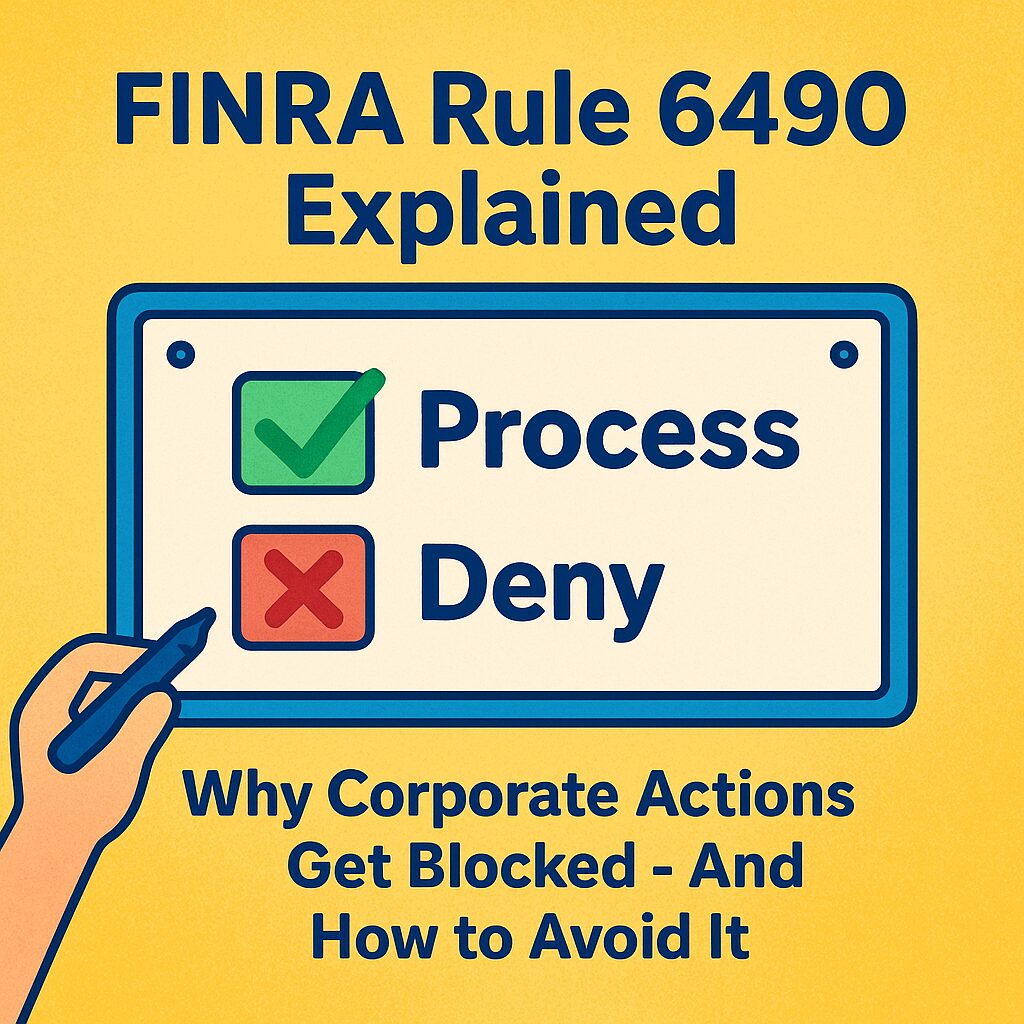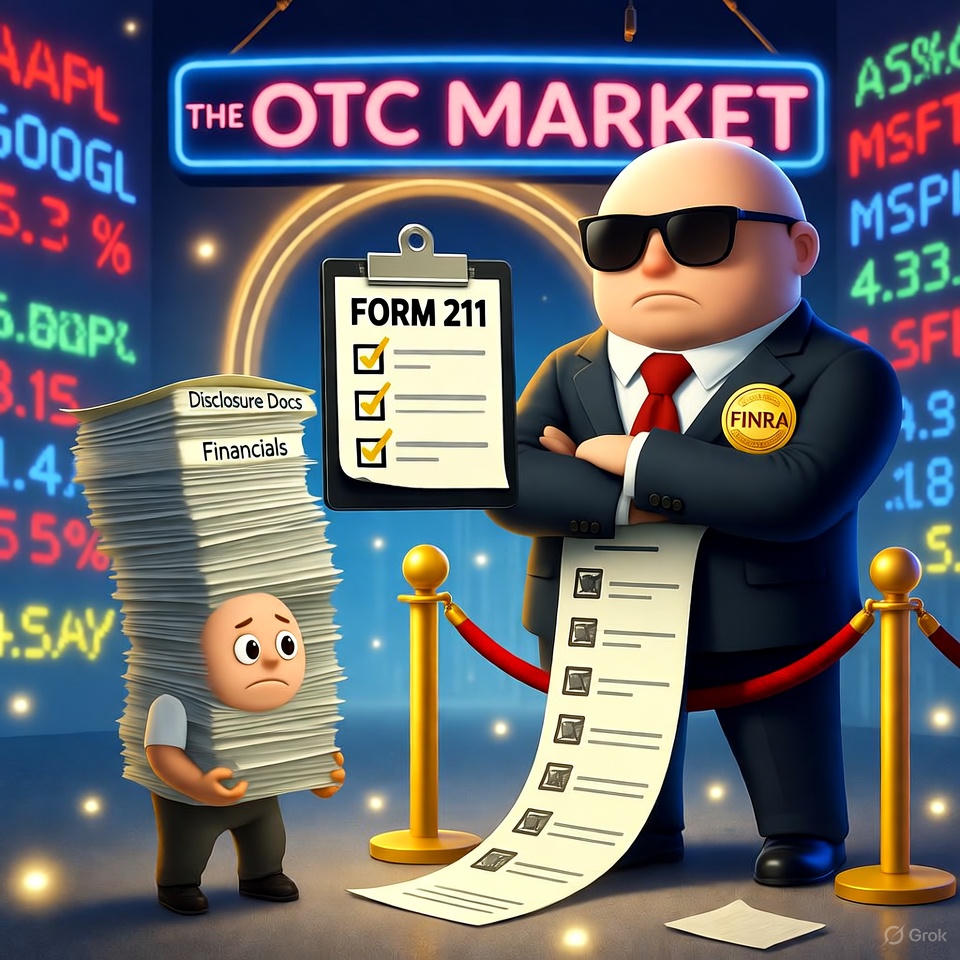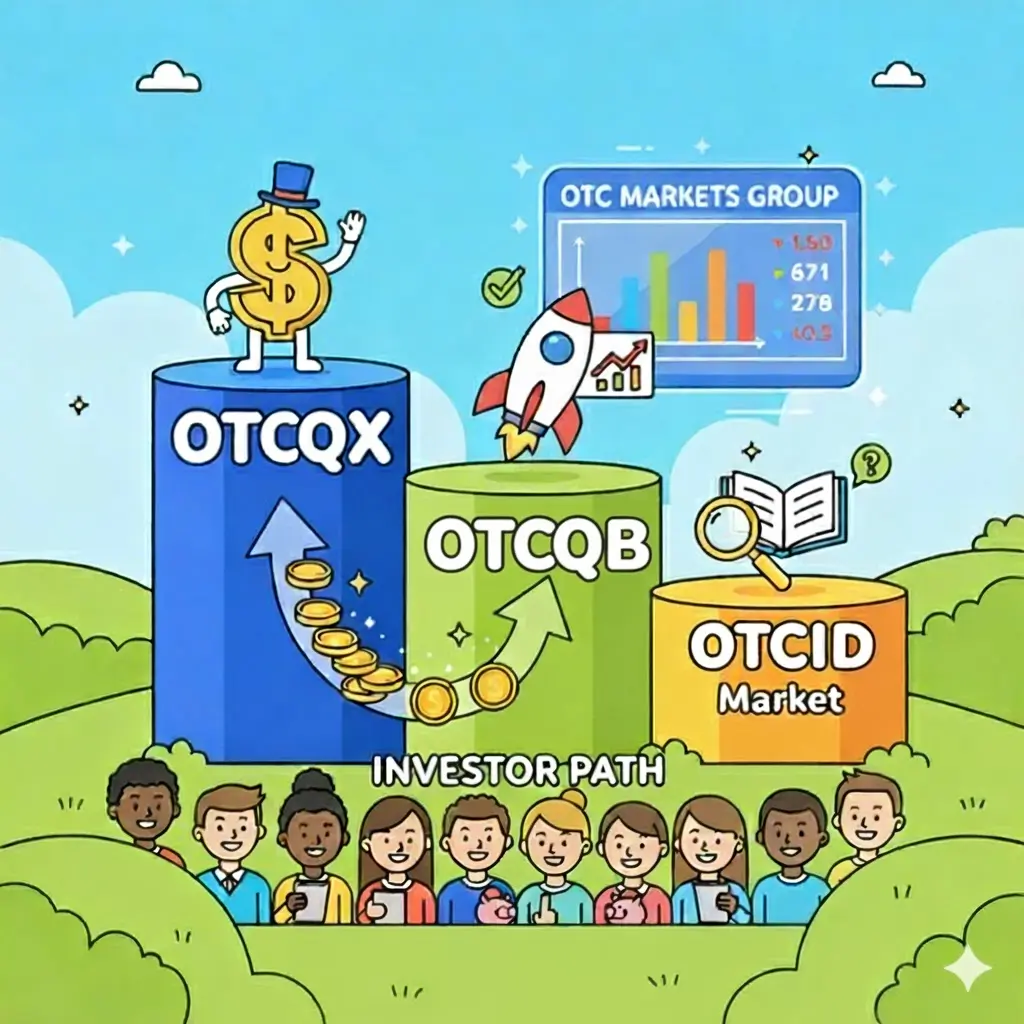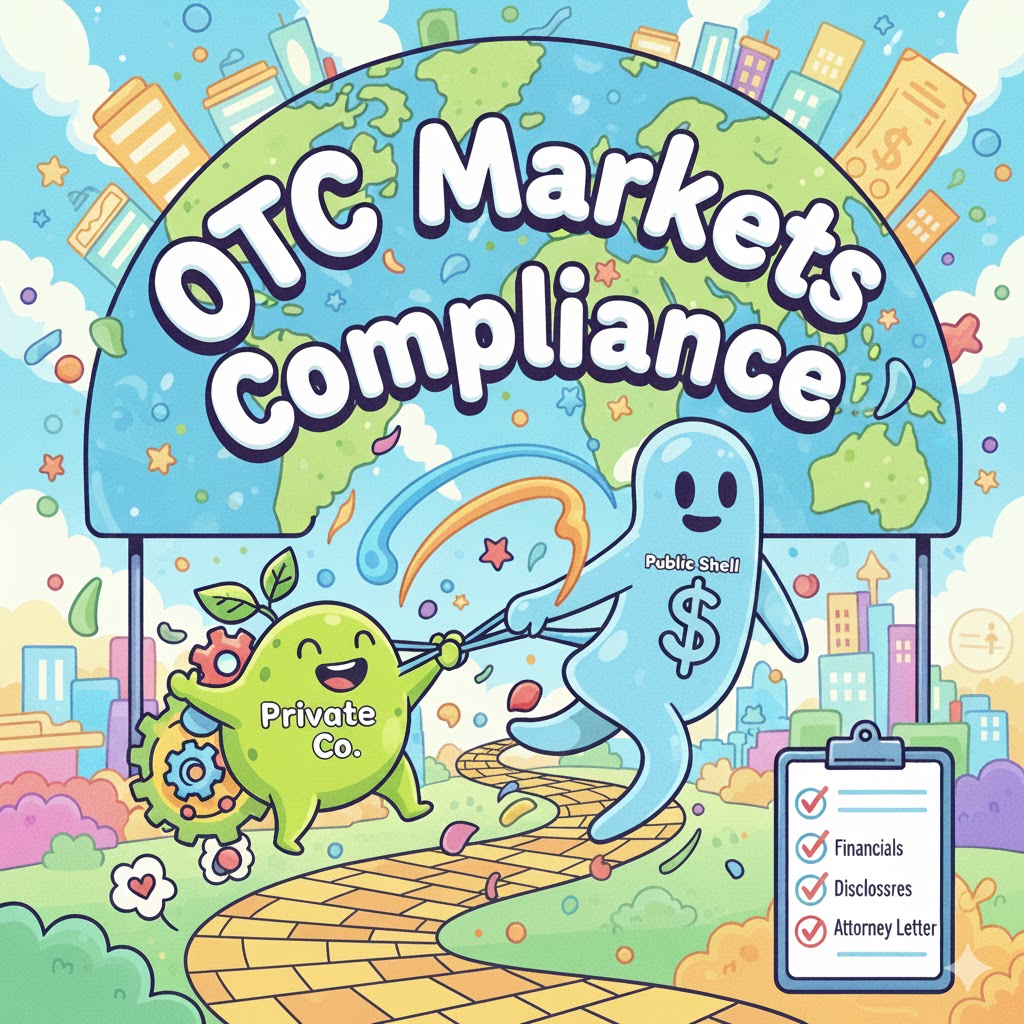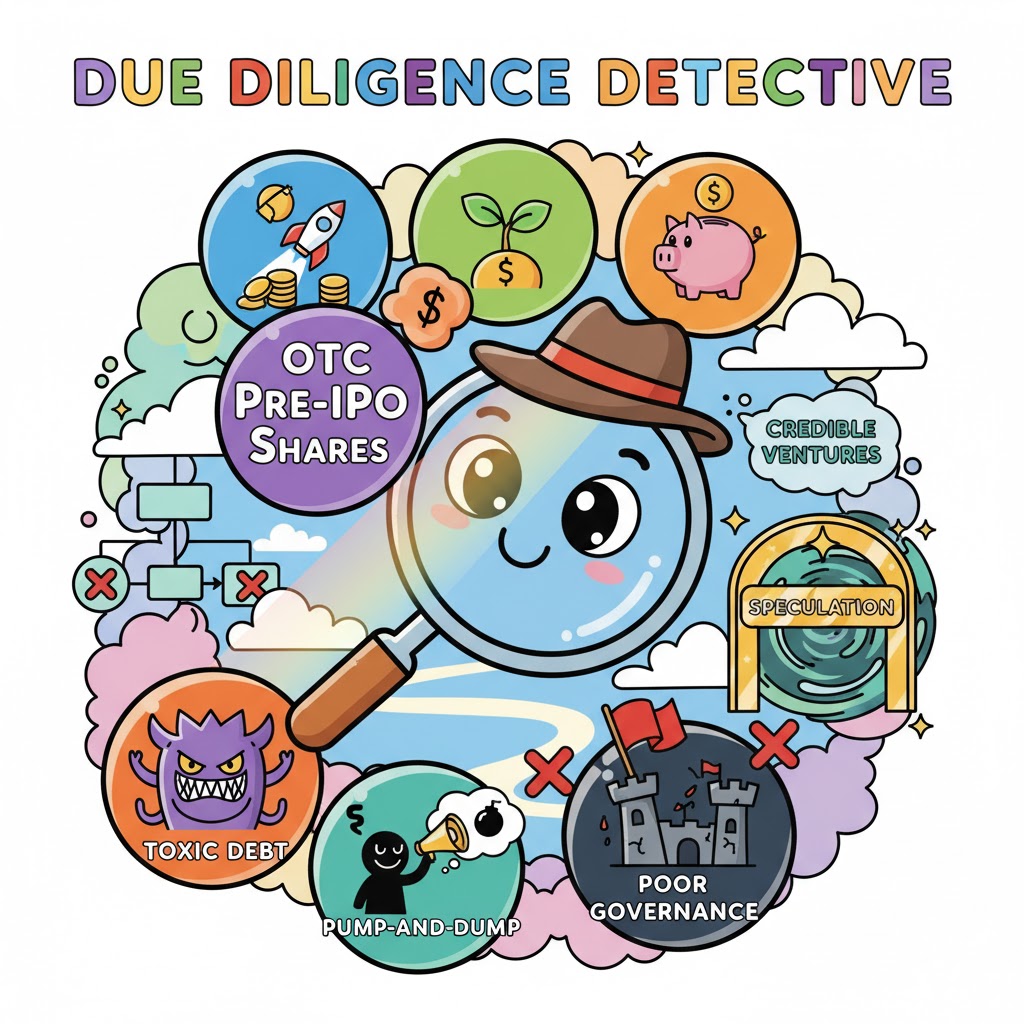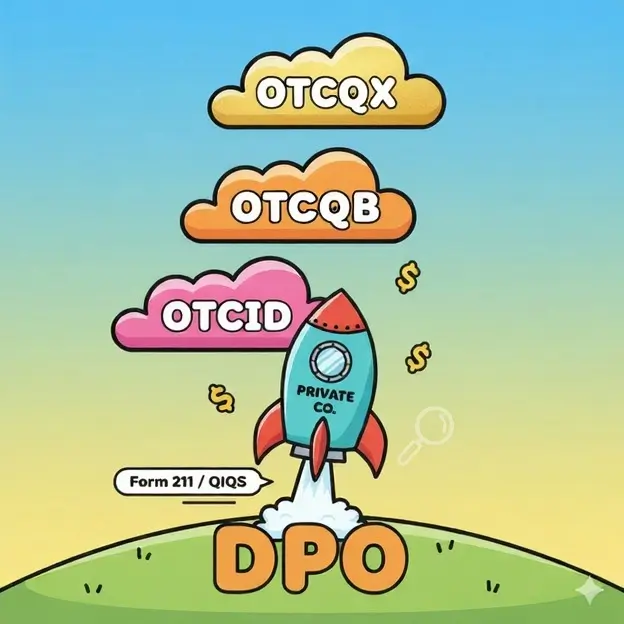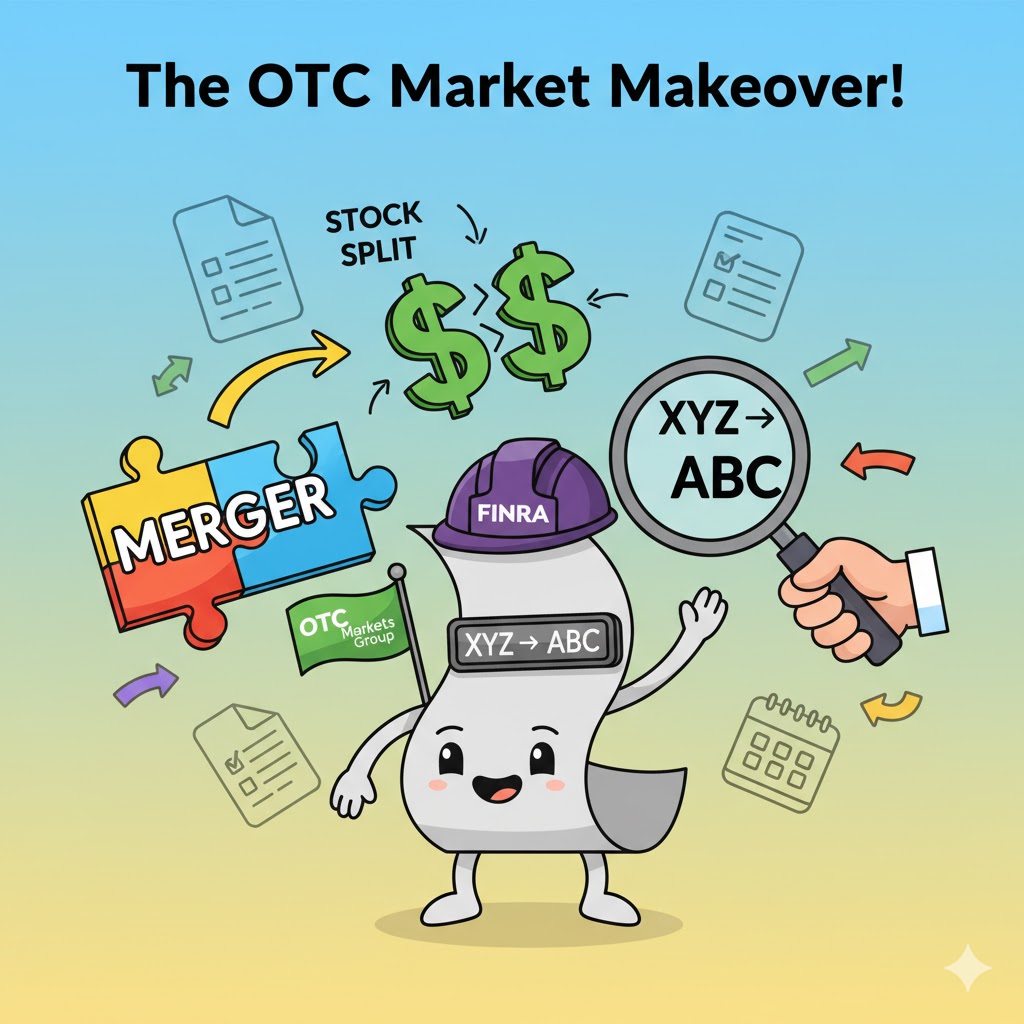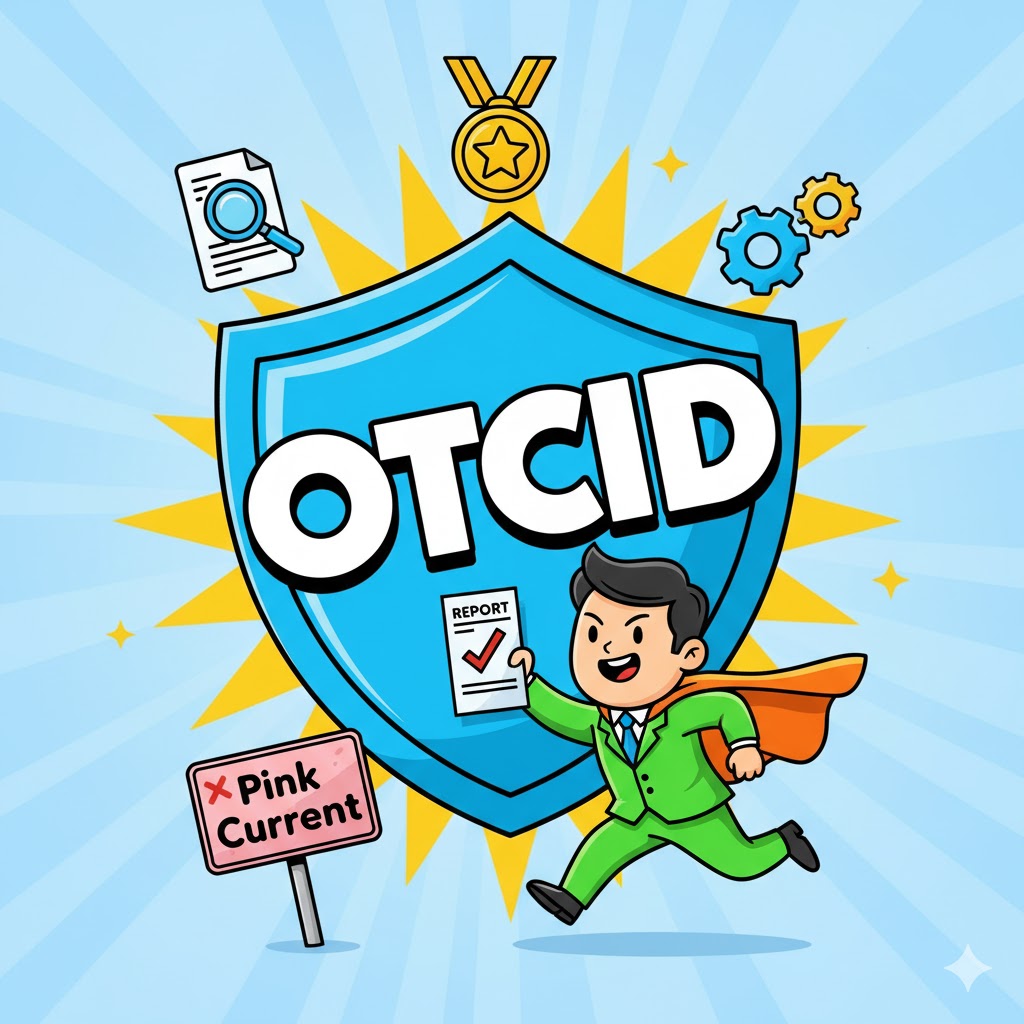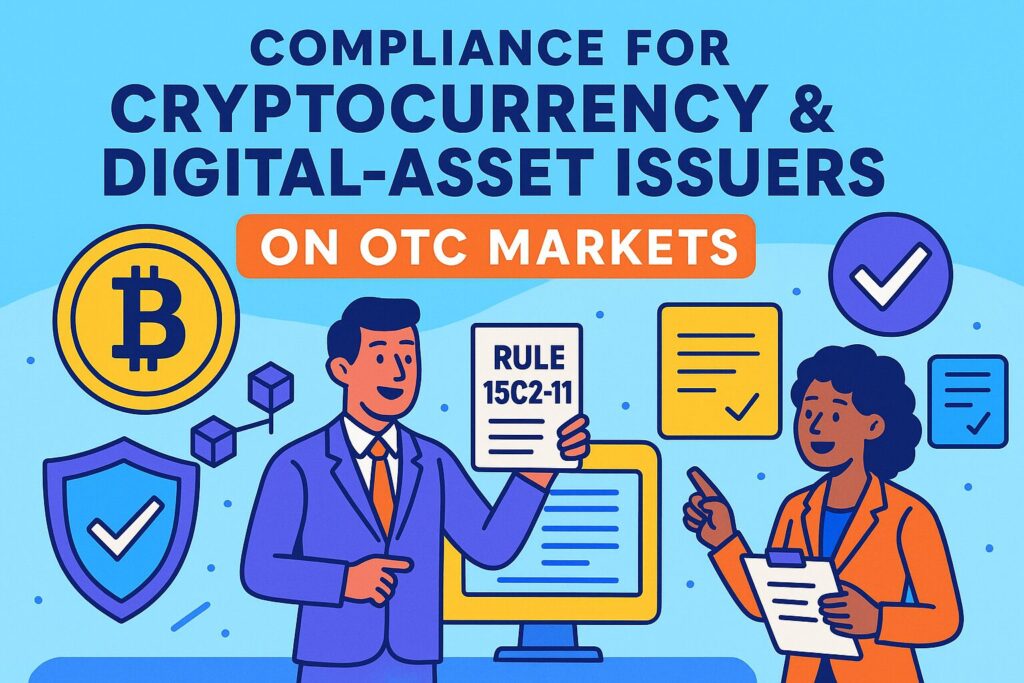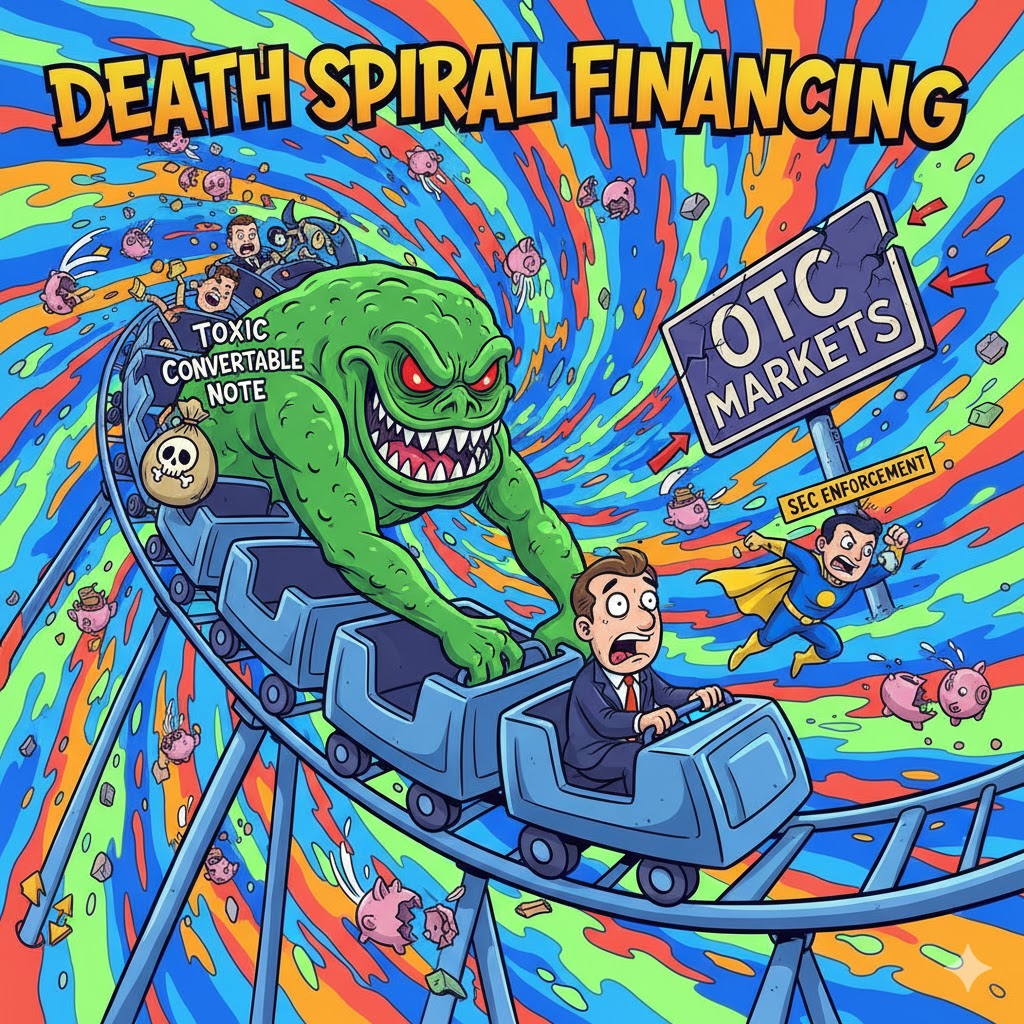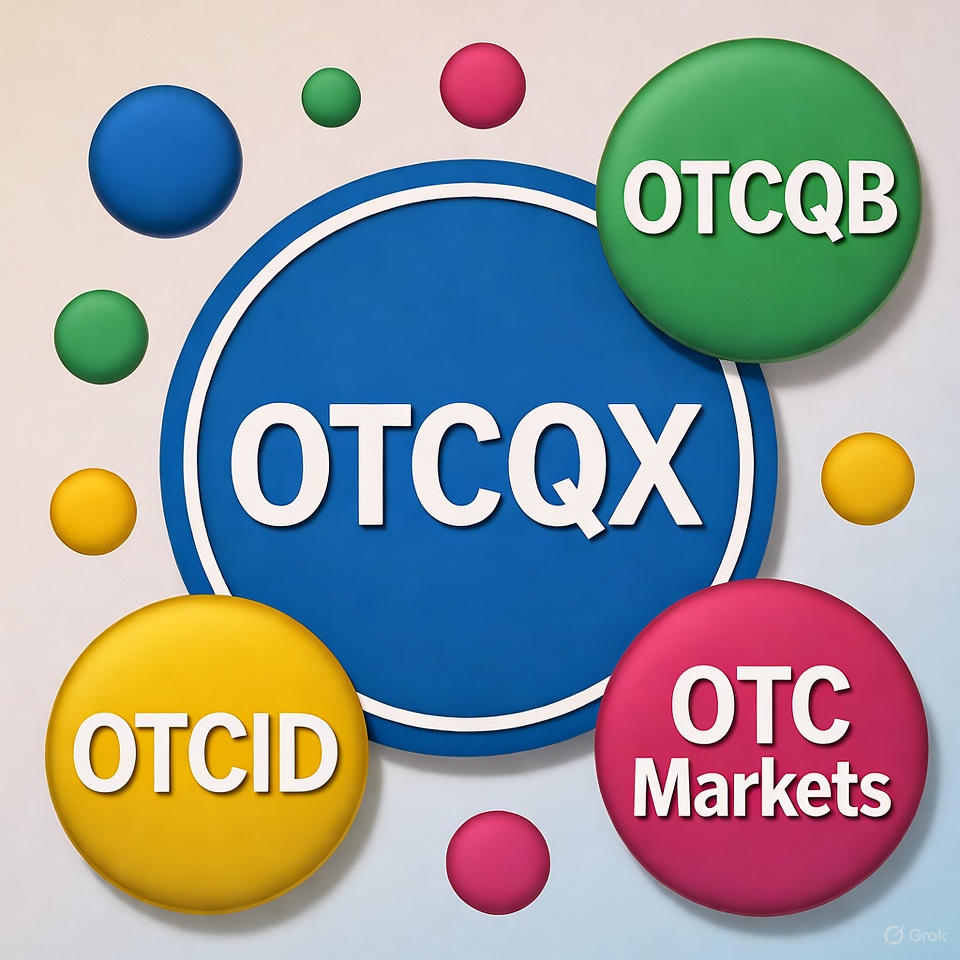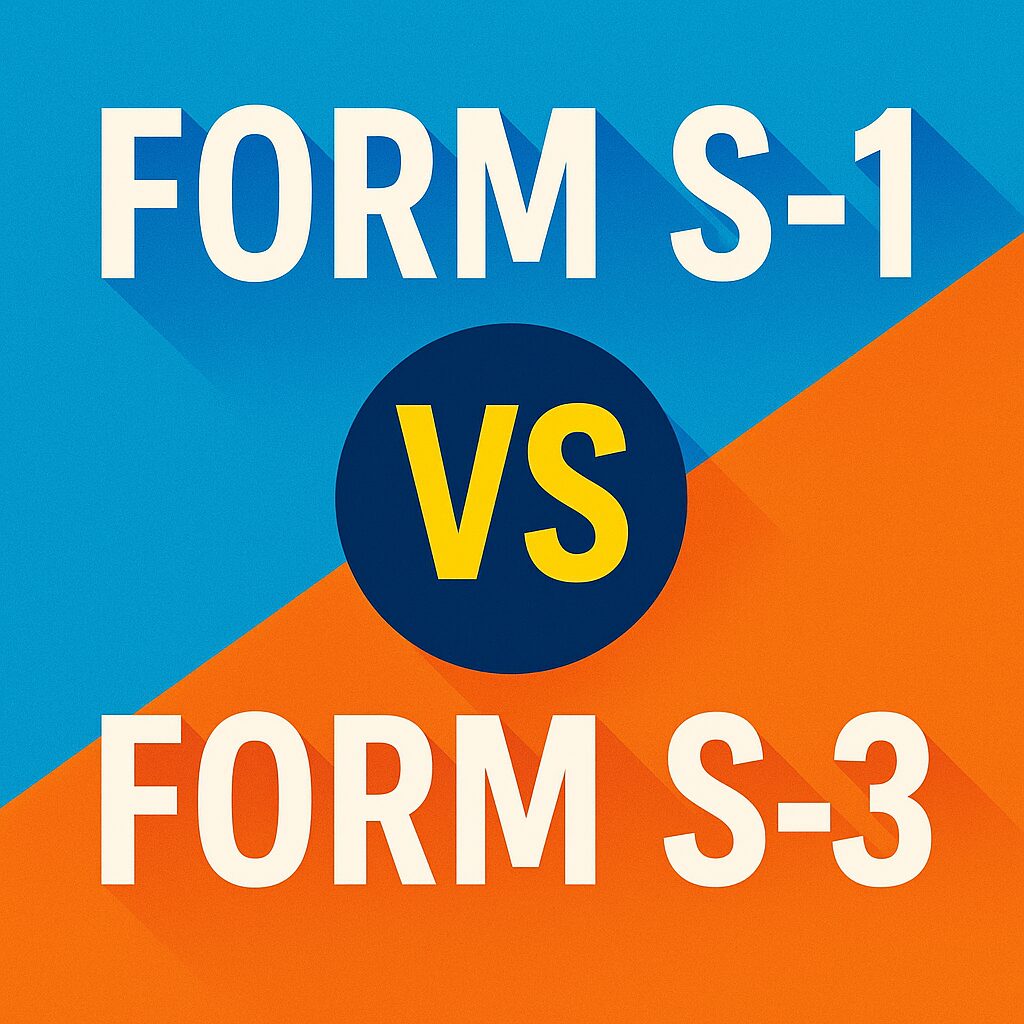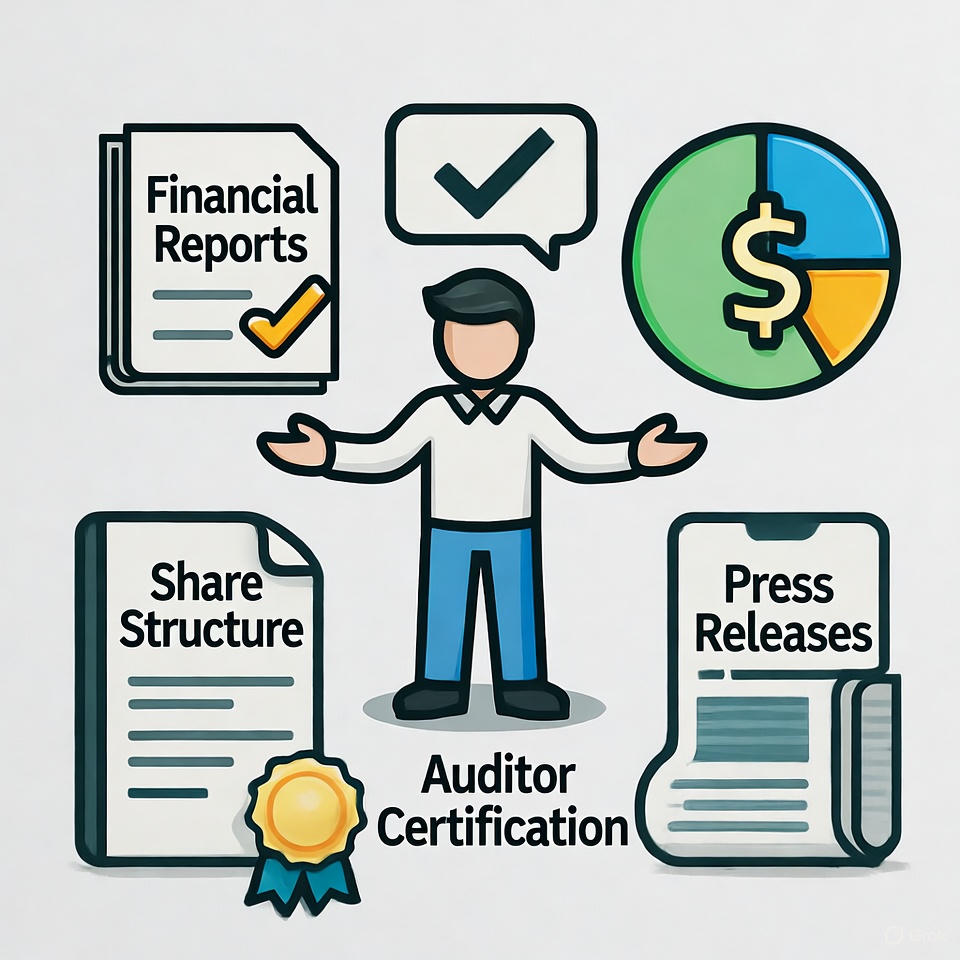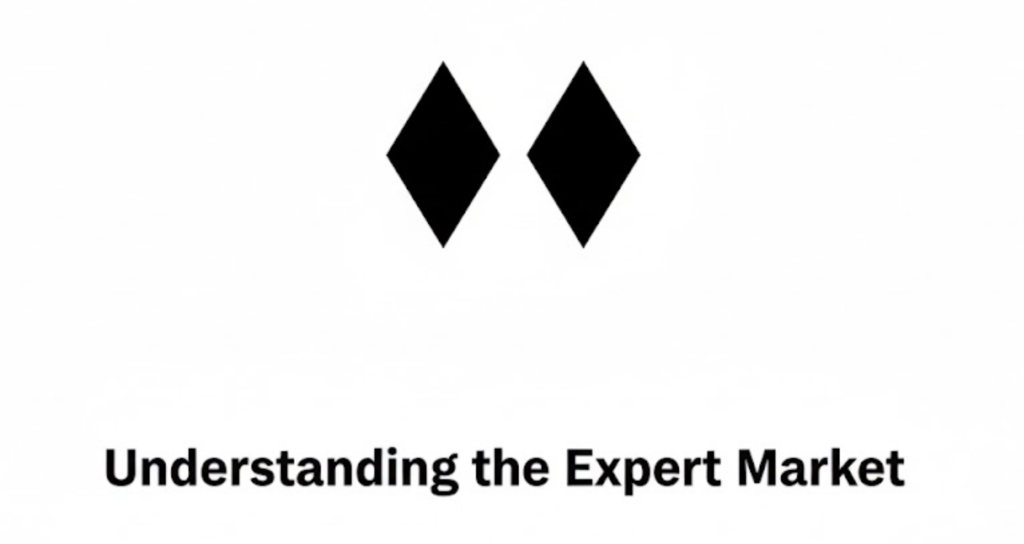FINRA Rule 6490 — When and Why FINRA Refuses to Process Corporate Actions for OTC Markets Issuers
Posted onFINRA Rule 6490 authorizes the Financial Industry Regulatory Authority (FINRA) to review, delay, or refuse to process corporate actions for companies whose securities are quoted on the Over-the-Counter (OTC) markets.
The rule protects investors and market integrity by ensuring that actions such as name changes, reverse stock splits, dividends, or spin-offs are implemented only after the issuer provides complete, accurate, and verifiable documentation. Read More
FINRA Requirements for Form 211: OTC Market Quotation Eligibility Explained
Posted onFor issuers seeking to have their securities quoted on the OTC Markets, the submission and clearance of Form 211 by a FINRA member market maker are crucial steps. This SEO-optimized guide explains FINRA Form 211 requirements, sponsoring market maker documentation, and how to find a market maker for OTC Markets quotation eligibility.
Form 211 ensures compliance with SEC Rule 15c2-11, which governs when a broker-dealer can initiate or resume quotations in an OTC security. Without FINRA Form 211 clearance, no public quotations can appear on the OTC Markets Group’s platforms. Read More
Supreme Court Petition in Xeriant v. Auctus Fund: A Defining Moment in the SEC’s War on Toxic Lenders
Posted onThe petition filed in Xeriant, Inc. v. Auctus Fund, LLC, before the Supreme Court of the United States, presents one of the most consequential securities-law questions in recent memory. It challenges a Second Circuit opinion that, if left standing, could unravel years of progress in protecting small public companies from predatory convertible-debt financing. The petitioner, represented by The Basile Law Firm, P.C., argues that the decision below conflicts with statutory text, established precedent, and the structure of the Securities Exchange Act of 1934.
I. The Question Presented
At issue is whether an unregistered dealer violates Section 15(a) of the Exchange Act merely by purchasing a convertible note, which is itself a security. The Second Circuit held that such a purchase does not violate the statute because the note agreement “did not obligate” the lender to act as a dealer. The petition argues that the Second Circuit’s interpretation reads words into the statute that do not exist and creates a direct conflict with decisions of other federal courts.
Read More
NASDAQ and NYSE Initial Listing Requirements
Posted onInitial listing requirements are the gatekeepers of the public markets. They calibrate who may access exchange‑based liquidity by aligning financial strength, shareholder distribution, and governance maturity with the expectations of institutional and retail investors. Although every issuer’s profile is unique, the logic of these standards is consistent: prove durability, prove breadth of ownership, and prove the capacity to operate as a public company from day one.
This article explains how companies can translate financial statements, capitalization plans, and board composition into an executable path to the NYSE or Nasdaq. Read More
OTC Markets’ Role in Secondary Offerings and Resales
Posted onRule 144 under the Securities Act of 1933 provides a safe harbor for investors to resell restricted or control securities without SEC registration if specific conditions are met. For securities traded on OTC Markets, an issuer’s compliance with Rule 15c2-11 and its current-information status directly affects whether those securities are eligible for resale under Rule 144.
Understanding Rule 144 and the Current Information Requirement
Rule 144 establishes conditions under which restricted or control securities may be resold. For non-reporting issuers, the key condition is that adequate current public information about the issuer is available, as outlined in Rule 144(c)(2). OTC Markets facilitates this disclosure through its OTCID Market platform, which satisfies the Rule 15c2-11 information standard. Read More
Tiers and Transparency: Understanding the Differences Among OTCQX, OTCQB, and OTCID Markets
Posted onThe OTC Markets Group operates a multi-tiered disclosure framework designed to categorize companies based on transparency, regulatory compliance, and investor protection. These tiers — OTCQX, OTCQB, and the newly structured OTCID Market — collectively form the modern over-the-counter (OTC) ecosystem.
The former Pink Market, long criticized for its lack of consistent disclosure, has been replaced by the OTCID (OTC Information Designation) market — a system designed to increase accountability and signal to investors the reliability of each issuer’s information.
Understanding the differences among these tiers is essential for investors, advisors, and issuers in determining where a company stands within the public markets and what its disclosure practices indicate about financial and operational health.
Overview of the Modern OTC Markets Structure
The OTC Markets Group functions as an electronic quotation system rather than a traditional exchange. It facilitates trading in securities of companies that do not meet — or have chosen not to pursue — the listing requirements of Nasdaq or the New York Stock Exchange (NYSE).
As of 2025, the three primary tiers are:
- OTCQX — The Premier Market for established, transparent issuers;
- OTCQB — The Venture Market for developing growth companies; and
- OTCID — The OTC Information Designation Market, which replaced the former Pink Market.
These categories reflect varying levels of disclosure, financial qualification, and investor risk. Read More
Why So Few Brokerage Firms Accept OTC Markets Shares — And What It Means for Investors
Posted onFor many retail investors, buying or depositing shares of OTC-traded companies is far more complex than it appears. Even when a security displays quotes on OTCQX, OTCQB, or the OTC Information Distribution (“OTCID”) platform, a surprising number of brokerage firms refuse customer deposits of certificates, block electronic transfers (DWAC / DRS / ACATS), or prohibit trading altogether.
These restrictions—driven by federal securities laws, FINRA and exchange rules, clearing-firm limitations, and internal risk controls—make investing in OTC companies far more complicated than trading exchange-listed securities. The result is constrained liquidity, wider spreads, and frustration for both investors and issuers.
This article explains why these limitations exist, how broker acceptance directly affects liquidity, and what issuers and investors can do to improve market access. Read More
How Foreign Issuers Use Rule 12g3-2(b) for OTC Quotation
Posted onForeign private issuers seeking U.S. market visibility without SEC registration often rely on Rule 12g3-2(b). This exemption allows non-U.S. companies listed on a qualified foreign exchange to trade on the OTCQX International or OTCQB Markets. It provides a cost-effective cross-border pathway for global companies to reach U.S. investors.
What is SEC Rule 12g3-2(b)?
Rule 12g3-2(b) provides an exemption from registration under Section 12(g) of the Exchange Act for certain foreign private issuers. It allows issuers to avoid duplicative SEC filings while ensuring U.S. investors have access to home-market disclosures.
- To rely on the exemption, an issuer must meet the following criteria:
- Primary listing on one or more foreign exchanges.
- Not required to file SEC reports under Section 13 or 15(d).
- Publication of English-language disclosures comparable to home-market requirements.
What Is a Direct Public Offering (DPO) on the OTC Markets?
Posted onA Direct Public Offering (DPO) on the OTC Markets allows a private company to make its shares publicly tradable without a traditional IPO or reverse merger. Existing shareholders can sell shares directly once the company is quoted under SEC Rule 15c2-11. A DPO provides liquidity and market visibility without the expense and complexity associated with an exchange listing. Read More
The Penny Stock Graveyard – The OTC Markets Expert Market Explained: What Happens When Issuers Lose Quotation Eligibility
Posted onThe OTC Markets Expert Market is often called the ‘penny stock graveyard.’ It’s where issuers go when they lose quotation eligibility under SEC Rule 15c2-11. Once downgraded, their securities are no longer publicly quoted on OTCQX, OTCQB, or OTC Pink, limiting trading visibility and liquidity.
The 2021 Amendments to Rule 15c2-11
In 2021, the SEC modernized Rule 15c2-11 to require that broker-dealers review publicly available, current information before quoting a security. The amendments eliminated exceptions that allowed quotations in issuers lacking public information, forcing noncompliant companies into the Expert Market. Read More
Material Event Reporting on the OTCID Market for Non-SEC Reporting Issuers
Posted onOn July 1, 2025, OTC Markets Group replaced its Pink Current Information tier with the new OTCID Market, a modernized disclosure platform aligning with SEC Rule 15c2-11. The OTCID Market (OTC Information Distribution) is now the recognized path for non-SEC reporting issuers to maintain current-information status and quotation eligibility. For background, see Pink Current Will Become OTCID on July 1, 2025.
Why OTC Markets Replaced the Pink Current Tier
- Improved Disclosure Quality – standardized filings under Rule 15c2-11.
- Integration with SEC Rule 15c2-11 – OTC Markets gained authority as a Qualified IDQS.
- Automated Data Integrity – structured data fields ensure accuracy.
- Tier Consolidation – unified OTCID transparency model.
- Market Credibility – enhanced investor trust through consistent reporting.
OTC Markets Issuers and SEC Reporting: Website Requirements and Best Practices (2025 Guide)
Posted onFor OTC Markets issuers that are SEC reporting companies, the company website serves as a crucial compliance and investor-relations tool. Although the OTC Markets Group does not impose the same tier-specific website posting requirements as the national exchanges, SEC-registered issuers quoted on the OTCQB, OTCQX, or OTCID tiers must comply with federal disclosure obligations under Regulation FD and the Securities Exchange Act of 1934.
A well-organized website demonstrates transparency, strengthens investor confidence, and supports compliance with both SEC and OTC Markets information standards.
SEC Regulation FD and OTC Issuers
Even though OTC issuers are not exchange-listed, Regulation FD (Fair Disclosure) applies equally to any SEC-reporting company that communicates material, non-public information to investors, analysts, or the media.
Under Rule 100 of Regulation FD (17 C.F.R. §243.100), when a reporting issuer discloses material information to select persons, it must simultaneously make that information public. The SEC’s 2008 interpretive guidance (Release No. 34-58288) recognizes that a company website can be a recognized channel of distribution for Regulation FD purposes if it is public, frequently updated, and identified in SEC filings as a source of company information.
Best Practices: Read More
OTC Markets Listing for Canadian Issuers
Posted onCanadian public companies can access U.S. investors by dual listing on OTC Markets through the Multijurisdictional Disclosure System (MJDS). This framework allows reliance on Canadian disclosure to satisfy U.S. requirements.
MJDS Overview
The MJDS allows eligible Canadian issuers to use Canadian filings to meet SEC disclosure obligations under Form 40-F.
Issuers must be incorporated in Canada, have been subject to continuous disclosure for 12 months, and meet float or alternative criteria. Read More
Compliance for Cryptocurrency and Digital-Asset Issuers on OTC Markets
Posted onCryptocurrency and blockchain companies seeking public quotation on the OTC Markets must navigate complex securities regulations. Following the SEC’s 2021 amendments to Rule 15c2-11, issuers must provide transparent, verifiable information before broker-dealers may publish or maintain quotations. This includes companies involved in token issuance, mining, decentralized finance, and blockchain infrastructure.
Regulatory Overview: Rule 15c2-11 and Crypto Issuers
Under Rule 15c2-11, broker-dealers cannot publish quotations without reviewing current public information. Digital-asset issuers must disclose detailed information about their blockchain operations, token economics, custody structures, and regulatory risks.
Toxic Convertible Financing and OTC Markets Issuers
Posted onToxic convertible financing, also known as ‘death spiral financing,’ is a common pitfall for small and emerging companies trading on the OTC Markets. These financings typically involve convertible promissory notes that convert into stock at deep discounts to market price. Although these transactions may appear to offer quick funding, they often lead to severe shareholder dilution and SEC enforcement scrutiny.
What Is Toxic Convertible Financing?
Toxic convertible debt usually involves a note that converts into common stock at a floating conversion rate, often at a discount to the lowest trading price during a look-back period. With no floor on the conversion price, the number of shares issued increases as the stock price falls, creating a cycle of dilution and price decline. Read More
Comparing OTCQX, OTCQB, and OTCID: Which Tier Is Right for Your Company?
Posted onThe OTC Markets Group operates the primary trading platform for thousands of public companies outside the Nasdaq and the NYSE. Its three main tiers—OTCQX, OTCQB, and OTCID (formerly OTC Pink)—serve issuers at different stages of growth and compliance readiness. Selecting the correct tier can impact investor perception, liquidity, and long-term uplisting potential. Read More
Form S-1 vs. Form S-3: A Practitioner’s Guide to Eligibility, Disclosure, and Incorporation by Reference (2025)
Posted onForm S-1 and Form S-3 are the two most common registration statements under the Securities Act of 1933. While both forms register securities for sale to the public, they differ dramatically in eligibility, disclosure format, and incorporation by reference options. Form S-1 is the long-form registration statement, available to all issuers, and requires a full standalone prospectus. Form S-3 is the short-form for seasoned reporting issuers that meet eligibility criteria, allowing heavy reliance on incorporation by reference. Read More
SEC Confidential Treatment Requests: Protecting Sensitive Business Information in SEC Filings (2025)
Posted on
Introduction: Protecting Trade Secrets in Public Filings
Public companies and SEC registrants must disclose material agreements, technical data, and financial details in registration statements and periodic reports. However, certain commercially sensitive information—such as pricing formulas, proprietary technology, or customer data—can be withheld under confidential treatment provisions of the federal securities laws. The SEC Confidential Treatment Request (CTR) process allows issuers to protect bona fide trade secrets and competitively sensitive information while maintaining compliance with the Securities Act of 1933 and Securities Exchange Act of 1934.
Regulatory Basis for Confidential Treatment
Confidential treatment is governed by Rule 406 (Securities Act) and Rule 24b-2 (Exchange Act). These rules allow protection for information that would otherwise be public if the issuer demonstrates substantial competitive harm and qualifies under FOIA Exemption 4. Rule 406 applies to registration statements such as Forms S-1, S-3, and F-1, while Rule 24b-2 applies to reports such as Forms 10-K, 10-Q, 8-K, 20-F, and 6-K. Read More
Uplisting from OTC Markets to Nasdaq or NYSE: The Uplisting Path and Compliance Milestones
Posted onFor many emerging public companies, the OTC Markets represent the first rung on the ladder toward accessing institutional capital. But for issuers seeking broader exposure, deeper liquidity, and valuation credibility, the ultimate objective is an uplisting to a national securities exchange — the Nasdaq Stock Market (Nasdaq) or the New York Stock Exchange (NYSE). Read More
Common Disclosure Deficiencies Leading to OTC Markets Suspension
Posted onThe OTC Markets Group serves as a central trading venue for thousands of public companies. Under Rule 15c2-11, broker-dealers may only publish quotations for issuers with current, publicly available information. When disclosures are missing, inconsistent, or unreliable, OTC Markets may suspend quotation or downgrade the issuer to the Expert Market, restricting trading to broker-dealers and institutions.
Failure to Provide Timely Annual or Quarterly Reports
Issuers on OTCQX, OTCQB, or OTCID Current Information tiers must post annual and quarterly financials within the required timeframes. Missing or outdated filings often trigger automatic downgrade or suspension.
Common violations include:
- Outdated or incomplete financial statements.
- Missing MD&A comparisons or liquidity analysis.
- Delayed filings for multiple quarters.
Annual and Quarterly Reporting Under the OTC Markets Alternative Reporting Standard
Posted onThe OTC Markets Alternative Reporting Standard provides a disclosure framework for companies that are not required to file reports with the SEC. Under this standard, issuers post financial and corporate information to the OTCIQ disclosure portal to satisfy the public information requirements of Rule 15c2-11. To maintain Current Information status, issuers must publish annual and quarterly reports, officer certifications, and a Manager’s Certification with Respect to Current Information.
Who Must Comply With the Alternative Reporting Standard
The standard applies to non-SEC-reporting issuers quoted on OTCID (Current Information) or OTCQB, certain foreign private issuers not filing Form 20-F or 6-K, and private companies seeking quotation under Rule 15c2-11. Failure to post required disclosures leads to a downgrade or suspension.
Understanding Rule 15c2-11 Current Information Standard
Posted onFor companies quoted on the OTC Markets, maintaining “Current Information” status is essential to avoid downgrade or suspension. Under SEC Rule 15c2-11, broker-dealers may publish or maintain quotations only when an issuer’s disclosures are accurate, complete, and publicly available. OTC Markets evaluates whether the information posted by an issuer meets this standard, and failure to comply may lead to placement on the Expert Market.
The Role of Rule 15c2-11 in the OTC Markets
Rule 15c2-11 ensures that companies quoted on the OTC Markets provide current and reliable information. Before a broker-dealer initiates or resumes quotation, it must review financial, management, and corporate information that allows investors to make informed decisions.
- Current balance sheet and profit-and-loss statement.
- Share structure and capital organization.
- Management and control information.
- Business operations and risk factors.
- Disclosure of material contracts and legal proceedings.
How the OTC Markets Expert Market Works – Securities Lawyer 101
Posted onThe 2021 amendments to SEC Rule 15c2-11 reshaped how broker-dealers publish quotations for OTC securities. Under the new framework, only issuers with current, publicly available information can maintain quotations. Issuers that fail to meet disclosure requirements are moved to the OTC Markets Expert Market, where trading is limited to broker-dealers and qualified institutions.
What Is the OTC Markets Expert Market?
The Expert Market is the lowest OTC Markets tier and serves as a restricted venue for institutional participants. It replaces the former ‘No Information’ category, limiting access to professional investors only.
- No public quotation visibility for retail investors.
- Only broker-dealers and qualified institutions can trade.
- Quotations are limited to unsolicited broker-dealer transactions.
- Effective since September 28, 2021, under Rule 15c2-11.



